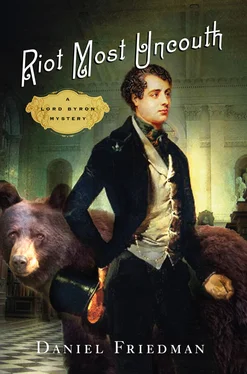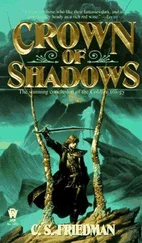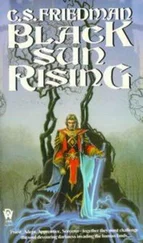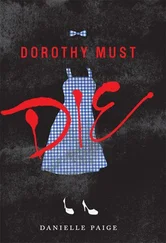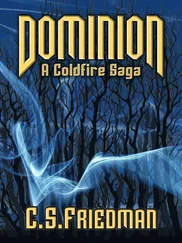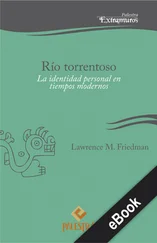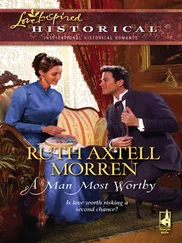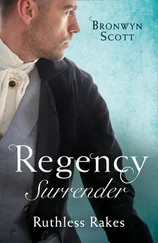Daniel Friedman - Riot Most Uncouth
Здесь есть возможность читать онлайн «Daniel Friedman - Riot Most Uncouth» весь текст электронной книги совершенно бесплатно (целиком полную версию без сокращений). В некоторых случаях можно слушать аудио, скачать через торрент в формате fb2 и присутствует краткое содержание. Год выпуска: 0101, ISBN: 0101, Издательство: St. Martin, Жанр: Исторический детектив, на английском языке. Описание произведения, (предисловие) а так же отзывы посетителей доступны на портале библиотеки ЛибКат.
- Название:Riot Most Uncouth
- Автор:
- Издательство:St. Martin
- Жанр:
- Год:0101
- ISBN:9781250027580
- Рейтинг книги:5 / 5. Голосов: 1
-
Избранное:Добавить в избранное
- Отзывы:
-
Ваша оценка:
- 100
- 1
- 2
- 3
- 4
- 5
Riot Most Uncouth: краткое содержание, описание и аннотация
Предлагаем к чтению аннотацию, описание, краткое содержание или предисловие (зависит от того, что написал сам автор книги «Riot Most Uncouth»). Если вы не нашли необходимую информацию о книге — напишите в комментариях, мы постараемся отыскать её.
Riot Most Uncouth — читать онлайн бесплатно полную книгу (весь текст) целиком
Ниже представлен текст книги, разбитый по страницам. Система сохранения места последней прочитанной страницы, позволяет с удобством читать онлайн бесплатно книгу «Riot Most Uncouth», без необходимости каждый раз заново искать на чём Вы остановились. Поставьте закладку, и сможете в любой момент перейти на страницу, на которой закончили чтение.
Интервал:
Закладка:
“Take Lord Byron into custody,” Dingle ordered. “If he resists, you may use deadly force.”
Angus didn’t do anything; he was waiting for direction from Knifing.
“Fielding, if you have any respect for me, as an investigator or as a colleague, I think you should delay your decision to arrest Lord Byron,” Knifing said. “There are too many facts that don’t fit neatly into the picture. We cannot, for example, place Byron at the scene of any of the murders at the times they were committed, and Byron was hosting a party in his residence, among two dozen witnesses, at the time Cyrus Pendleton was most likely killed.”
“Such esoteric points will hardly hold a court’s attention once I have shared the grisly details of these slayings.”
Some tiny change in Knifing’s features, the deepening of some crease or a slight twitch of an eyebrow, was the only demonstration of his boundless contempt for Dingle. “Recognition of esoteric points and their significance is instrumental to the craft of criminal investigation,” he said. “Any lay observer or volunteer watchman can document grisly details.”
The casual insult seemed to deflate Angus, but Dingle was uninterested in lectures, and did not seem to perceive the menace beneath Knifing’s gentle tone. “Will you throw public doubt upon my case?”
“Doing so would harm both our reputations,” Knifing said.
“You have more to lose than I.” Dingle seemed to realize, with some surprise, that he had the upper hand in this negotiation. He blinked with dumb astonishment.
“If you charge Lord Byron with the killings, I will not dispute your conclusions,” Knifing said. “But I will not testify in support of them either. If you do this, you will do it alone. I’ll have no part in such folly.”
“If he is convicted, I’ll have a place among the eminences of the field,” Dingle said.
“Once I am acquitted, I’ll see that you are stripped of your assets and your credibility, and that you die destitute and reviled,” I told him.
“Perhaps you shall,” said Fielding Dingle. “But first, you will wear shackles.”
Chapter 30
All earth was but one thought-and that was death,
Immediate and inglorious; and the pang
Of famine fed upon all entrails-men
Died, and their bones were tombless as their flesh;
The meagre by the meagre were devour’d
- Lord Byron, “Darkness”Two secure carriages were parked on the thoroughfare in front of the Great Gate to the Great Court. Joe Murray had hired one of them to carry the Professor home to Newstead, where his calm demeanor and steadfast resolve would make him a fine companion for my mother during the difficult months that were surely ahead of us as I faced trial for murder.
Fielding Dingle had procured the second from a gentleman several towns over who was an acquaintance of Angus the Constable; a prison carriage, specially built for use in transporting criminals to remote courts to stand trial. It was a solid box constructed from thick planks of lumber, with only narrow slits near the roof to let in a little light and even less air. It was quite unlike other stagecoaches I’d hired, which usually had big open windows that offered riders access to cooling zephyrs and fine views of the countryside.
“What in seven hells do you think you’re doing?” Archibald Knifing asked Dingle, who was half-dragging me out of the student residence building and toward this monstrous conveyance.
“I am delivering this suspect to the magistrate’s office in London,” said the fat investigator.
“Your stupidity continues to astonish me,” Knifing said. “The trial must be held in Cambridge. The witnesses are all here. The physical evidence is all here. You ought to sequester Byron in his rooms and send for a prosecutor and a traveling judge.”
“I’ll not give him a chance to commit more atrocities, nor will I give you a chance to undermine my case. I’m taking him to London.”
“I’ll stand guard over him in his apartment, if you like, Mr. Dingle,” said Angus. “I can batten things down tight. He won’t get loose.”
“If you take him away from here, you’ll have no case,” Knifing said. “Who in London will testify to the events you allege? What can you produce there in support of your theories? This is a baron you’re accusing, and he’ll mount a vigorous defense.”
“I’ve always collected my bounties from the office in London, and I see no reason to deviate from my custom,” said Dingle, unmoved by Knifing’s logic. “You have your way of doing things, and I have mine.”
“The habits of a penny-ante thieftaker are ill-suited to the work of a professional criminal investigator,” said Knifing. “There are established procedures, and you aren’t following them.”
“You said you’d have no part in my folly,” Dingle said. “That’s fine with me, but I’d appreciate it if you’d take no part in a quieter fashion.”
“You twit,” said Knifing. “You simpering imbecile.”
“Bugger off,” said Dingle.
The seats in the prison coach left much to be desired; they were hard wood benches bolted securely to the walls and floor. Iron rings protruded from the back of the bench, so the chains on my shackles could be looped through them, immobilizing my arms and legs.
I thought it unwise to risk giving Dingle a reason to attempt to use lethal force, but neither did I cooperate with his attempt to load me into the stagecoach. I just sort of let my body hang limp, so the fat man had to physically haul me into the vehicle. Momentarily, I regretted my weight-loss, but that sentiment was short-lived. The only thing worse than being forced to stand trial for horrific crimes is being forced to do so while also being fat.
Angus and Knifing watched as Dingle and the carriage driver lifted me into the cab. They made no attempt to help. Angus sucked on his mustache and shifted on his feet; I knew he didn’t think I’d done the killings, but he revered the investigators. The idea that someone like Dingle could be so confidently and decisively wrong shook the foundation of the constable’s worldview. Knifing’s features remained, as ever, sour and inscrutable.
Only steadfast Joe Murray seemed unconcerned. He’d been through this same procedure with my great-uncle William, the fifth Lord Byron. Twice, actually. In addition to stabbing poor Lord Chaworth, my predecessor also killed his chauffer for driving too slowly. As the servants at Newstead told the story, William shot the man in the back and threw the corpse into the Lady Byron’s lap so he could climb up onto the driver’s seat and whip the horses. Due to the difference in social standing between the killer and the victim, William never stood trial for that one. His wife left him soon after, however.
It took Dingle fifteen minutes of monumental effort to get me chained to the bench inside the carriage, and when he finished, he was wheezing and drenched with sweat.
“You look awful,” I said. “Are you feeling ill?”
“I hope you’re this droll on the day you hang,” he said, and he pulled the door of the carriage shut. Outside, the driver secured the padlock. The inner door had no handle, to prevent escape.
Dingle heaved himself onto the bench opposite me and leaned forward on his hammy haunches. Up above, the driver whipped the horses, and the coach lurched into motion.
“Old Knifing makes a great show of his supposed skill at tracking and detection,” he said. “But I figure there’s a reason the red Indians and the African blacks who showed him his trade never built themselves anything like a society. I don’t think foreign races that sleep in the dirt have anything useful to teach civilized folk.”
Читать дальшеИнтервал:
Закладка:
Похожие книги на «Riot Most Uncouth»
Представляем Вашему вниманию похожие книги на «Riot Most Uncouth» списком для выбора. Мы отобрали схожую по названию и смыслу литературу в надежде предоставить читателям больше вариантов отыскать новые, интересные, ещё непрочитанные произведения.
Обсуждение, отзывы о книге «Riot Most Uncouth» и просто собственные мнения читателей. Оставьте ваши комментарии, напишите, что Вы думаете о произведении, его смысле или главных героях. Укажите что конкретно понравилось, а что нет, и почему Вы так считаете.
